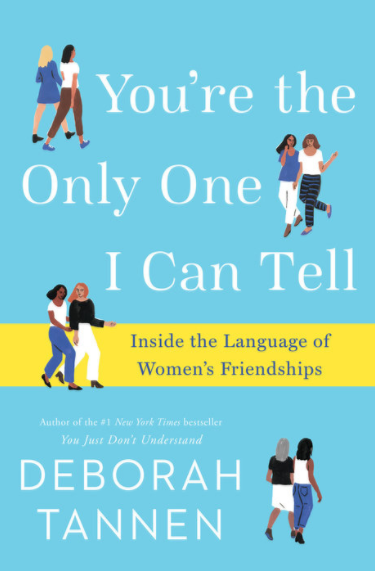
In high school, I was part of a trio: Marlene, Susan and I were constant companions–until one day, for reasons she did not disclose, Susan refused to have anything more to do with me. Marlene tried to stay friends with both of us, but since that meant sticking with Susan, I was locked out. Being cut off by a close friend, someone integral to my daily life, was shattering. But I learned, as I interviewed over eighty girls and women (ages 9 to 97) for a book about friendship, that cutoffs are a common calamity. And so is ghosting.
I heard many accounts of cutoffs and ghosting — both from those who’d suffered from it and those who’d done it. The ugliest stories were about being ousted by a group of friends in middle school or high school. And it haunted not only the ejected but also the ejectors. For example, a woman, Annie, said she still feels regret and shame for not speaking up when, in tenth grade, her entire friends group turned on one member. Annie wasn’t the ringleader, but, she said, “I went along. And we had been very, very close friends.”
Most of those who had been cut off said they didn’t know why. But those who said they’d cut off a friend always told me the reason. For example, a woman, Linda, said she had let a friend stay with her for what was supposed to be a brief time. As the days became weeks and then months, she finally asked the friend to leave. Instead of thanking her for months of hospitality, the friend exploded in anger. “If your boyfriend moves in,” she snarled, “you’ll probably kick him out after a few months, too!” Linda never spoke to her again.
Even when a cutoff is traced to a single outrageous thing said or done, that supremely tellable violation usually caps frustrations that had been mounting over time. For example, a college student recalled a high school friend who “was great and funny and just a riot. She was a hoot, and great to be around.” But the friend’s jokes were often barbed — and made her feel terrible. “It just kind of built up,” the student said. “I didn’t want to keep enduring it.”
Comments about erstwhile friends included: “She made me feel inadequate and intimidated, correcting my grammar and always having done one better”; she “did a number on me, made me feel inadequate, awkward, unattractive”; “She made me feel inadequate and depressed.” All these descriptions include the word “inadequate” — that universal fear that we are just not good enough. And the same fear is part of why it is so painful to be ghosted.
Why cut someone off without saying why? For one thing, explaining opens a conversation, implying you want to work things out, which you don’t. But there’s another reason, too. Many of us find it hard to say anything negative outright, so we swallow our hurt—until it chokes us. Ghosting means still not saying anything negative. Someone told me he calls this “stamp collecting.” When a person you’re close to does something you don’t like, you say nothing, but put a stamp in your book. When the page is filled with stamps, you slam it shut and throw the book at them.
For those who are pondering what they did to cause them to be ghosted, it may help to know the answer may be: nothing. A woman was relieved when–-decades later— a friend who had disappeared reconnected and explained that she’d been going through a tough time and had cut everyone off. Another woman recalled her own habit, when she was younger, of cutting friends off: she’d pursue a friendship, then feel overwhelmed by the closeness she’d created — and flee. A particularly unjust—and pernicious — reason may have been why Annie’s high school group turned on one of their own. Annie recalled that the victimized friend “was good at every sport and cute.” Sadly, it is common for girls to reject a girl who stands out or excels, labeling her “stuck up” or “a snob.”
Sometimes the decision to end a friendship wasn’t made by the friend herself, so both are victims. When young adults live with parents or guardians, the adults may demand a cutoff, because they disapprove of a friend, or — though they probably don’t think of it that way — because they envy the attachment and feel displaced by it. And that, it turns out, is what happened with my friend Susan.
In the years since she ended our friendship, I made many attempts to find Susan, to ask why. But, as often happens with women who marry and change their names, she couldn’t be found. From the moment I decided to write a book about friendship, I was determined to solve this mystery once and for all. When the book was pretty much done, I enlisted the aid of my friend Paul, who has a gift for finding people online. Luckily, Susan has a brother whose name has not changed and whose email address Paul found online. I emailed him, and he replied immediately, cc’ing his sister. Within a few hours — 54 years after our last conversation — I was talking to Susan on the phone. And the very first thing she said was that it was her older brother — not the one I’d emailed, but a different one — who had insisted she stop seeing me, because he felt I had too much influence over her. But looking back, she said, she thinks he was just jealous. And it broke her heart at the same time that it broke mine.
One of the wonderful things about friendship is that we get to choose our friends, an option we don’t have with family. But that also means we can choose to end a friendship — and a friend can choose to end it too. When that happens, it might help to know that others have suffered the same fate, and that sometimes it really is —as I learned was the case with Susan — not because of anything we did wrong. It might, in fact, be a testament to how important the friendship was.
Tannen is a linguistics professor at Georgetown University and the author of You’re the Only One I Can Tell: Inside the Language of Women’s Friendships

More Must-Reads from TIME
- Why Biden Dropped Out
- Ukraine’s Plan to Survive Trump
- The Rise of a New Kind of Parenting Guru
- The Chaos and Commotion of the RNC in Photos
- Why We All Have a Stake in Twisters’ Success
- 8 Eating Habits That Actually Improve Your Sleep
- Welcome to the Noah Lyles Olympics
- Get Our Paris Olympics Newsletter in Your Inbox
Contact us at letters@time.com